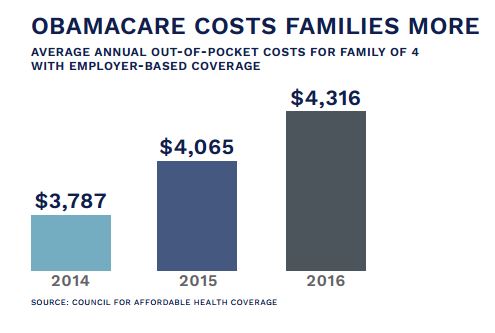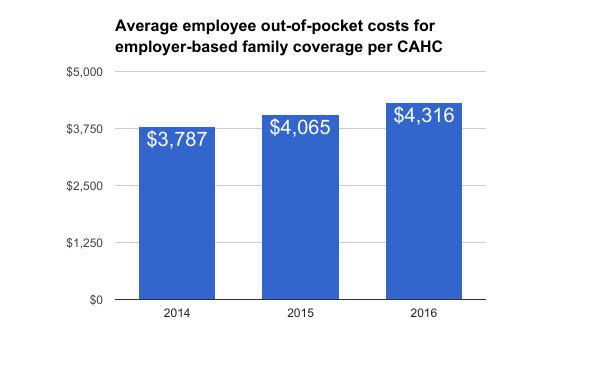Bad Chart Thursday: GOP Obamacare Chart Makes Case for . . . Obamacare

Last week, Politico shared the internal GOP policy brief for repealing and replacing the Affordable Care Act (aka Obamacare), a brief that inadvertently makes a pretty good case for not repealing the ACA at all.
No where is this better illustrated than in this chart:

The source is given as the Council for Affordable Health Coverage, a group lobbying for more competition in health insurance as a way to lower costs, despite years of evidence that this approach makes health care more expensive and completely out of reach for millions of Americans–except, of course, for those who died from lack of affordable care.
Perhaps letting the sickest among us die is the GOP master plan for manipulating the risk pool to bring down costs. Or perhaps the ACA really did fail to cover treatment for a selective amnesia epidemic among GOP politicians and lobbyists. Maybe this chart and the laughably bad policy brief it appears in are really just a cry for help.
That would certainly explain the blatant misrepresentation in this chart, to make the columns look hugely different in size by conveniently omitting y-axis info so no one would notice that the columns don’t start at zero. Here’s what these numbers actually look like:
Not to mention that neither chart shows what the original table title promises, to demonstrate that “Obamacare Costs Families More.” More than what? A year’s supply of Band-aids and aspirin? The chart doesn’t compare years under the ACA to the years before. There’s a reason for that, of course. Out-of-pocket costs were rising at a higher rate before ACA than they are now.
The GOP policy brief cites a Kaiser Family Foundation report, “2016 Employer Health Benefits Survey,” for the statistics in the brief, a report that demonstrates clearly that for every rise in costs cited by the GOP to criticize ACA, the costs were rising at the same rate or even higher and faster before ACA was implemented.
For example, the brief cites a rise in employer-sponsored family coverage premiums of $4,300 between 2010 and 2016. The rise between 2003 and 2009? $4,300. (Note that these numbers are for the premium totals for both employer and employee contributions. Employee annual premium costs rose $1,280 between 2010 and 2016 and $1,103 between 2003 and 2009, a difference that actually reflects employers on average choosing to pay a slightly smaller percentage of employee premiums. Many decisions related to employer-sponsored coverage rest more with employers than with the ACA, which is probably why the data cited from the KFF are oddly centered on employer coverage.)
Despite the extraordinary efforts of the GOP to manipulate and cherry-pick data in an attempt to portray Obamacare as a disaster, they are simultaneously demonstrating that for all the ACA’s flaws (and the ACA is definitely flawed), it is a vast improvement on the previous health insurance system, the system that the GOP and groups like the CAHC are basically pulling out of the trash and attempting to regift to us.





Well, Obamacare was essentially the GOP plan. (Romney’s plan, actually.) There are problems with it, but the only way to fix those problems would be to move left.
The GOP only makes fake attempts at moving left. Like, they oppose free trade because nationalism, while I oppose free trade because sweatshops. (Free trade is, like private prisons and hiring undocumented workers, just a way of perpetuating a slave economy in a state where slavery is illegal.)
Yeah, that’s one aspect of Obama’s attempts at compromise with the ACA, that we ended up with a GOP plan, so now the GOP is basically moving even more to the right with their plans.
I think we clearly need single-payer. All plans short of that are flawed, but the ACA is the least flawed of the options currently on the table.
Well, one problem is, the Democrats tend to fall into the trap that going rightward is the way to win elections. This…is sort of a holdover from 1972. Basically the Democrats were convinced they didn’t need unions because demographic inevitability, and then they got trashed in the presidential race. Nixon won by over 20% of the popular vote, only winning MA and DC, though one Virginia faithless elector went to the Libertarian candidate. Their much-vaunted demographic inevitability was also a lie: The Baby Boomers matured into Generation Dubya. (And this makes sense. If you were from the Silent Generation or before, the Republican Party was the party of Hoover; Ike could only win by including Roosevelt’s legacy in his vision of conservatism.)
Then in 1984, the same thing happened: They won MN and DC, and lost everywhere else. (The popular vote gap was “only” eighteen points, so, progress?)
In that, the DLC came onto the scene. While the Atari Democrats (Gary Hart, McGovern was actually a proto-Atari Democrat, an “Odyssey Democrat” if you will) also moved rightward, they were elitist, and the DLC felt almost populist, even though it was a completely inside-the-Beltway operation from soup to nuts. (And by “nuts” I mean voting to invade Iraq.) Fun fact: Koch Industries always had a chair at the DLC. Given that David Koch was a Libertarian vice presidential nominee in 1980, you can see where this is going (if “Koch Industries” didn’t give it away).
Regardless of the paradoxes, the DLC saw it as very simple: The Democrats just were never right-wing enough. So McGovern couldn’t have just ditched everything for some phantom promise, he was “too far to the left”. And Carter…won once, but we’ll ignore that. We’ll also ignore the Iran hostage crisis; he was also “too far to the left”. Mondale’s overall boringness and promising to raise taxes? (There hasn’t been a true fiscal conservative in the White House since the Hoover administration; instead, you have supply-siders.) You guessed it! And when Dukakis lost in 1988, it had nothing to do with the Willie Horton or some silliness involving a tank.
The DLC officially disbanded, but several organizations within the Democratic Party leadership structure regard themselves as its spiritual successors.
As an aside, one of the things that annoyed me last year was people saying that talking about the assassination of Berta Cáceres was sexist. Clintonistas dropping terms of art like “intersectionality” with no clue as to what they mean. Oh well, at least that won’t happen with Trump. *looks at article where Bannon says he wants to “deconstruct” the state* Oh crap.